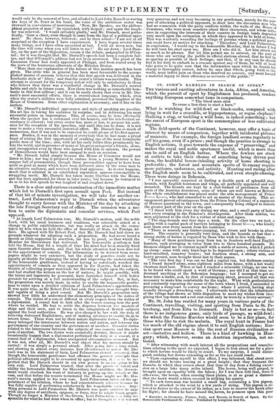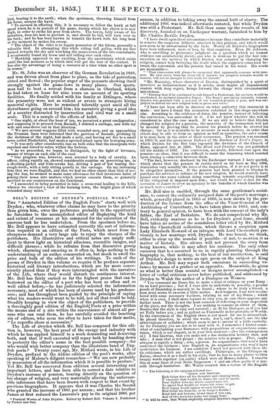ST. JOHN'S RAMBLES IN SEARCH OF SPORT. * THE various and
exciting adventures in Asia, Africa, and America, which the pursuit of sport by Englishmen has produced, renders anything European somewhat tame in comparison.
" The blood more stirs To rouse a lion than to start a hare."
What is watching for wild-fowl or black-cocks, compared with n g in wait aistat stag, rear crocotlge,aowr dhidpipeopotaiemiuns, or rogue elephant? tt:t
the rarest of European sport is the commonplace of less cultivated regions.
The field-sports of the Continent, however, may offer a topic of interest by means of comparison, together with incidental pictures of manners. For example, the foreign landlord seems regularly to sell his game, even if a prince ; and though the practice is strange to English notions, it goes towards the expense of "preserving," and makes the royal and noble sportsmen useful, which is more than can be said of an English battue. Where the fowlers are stuck at outlets to take their chance of something being driven past them, the healthful breeze-inhaling activity of home shooting is preferable ; . the forest and mountain sports of Germany. require more patience, endurance, and activity. Hunting and racing after the English mode seem.to be cultivated, and even steeple-chasing. These were doings in Bohemia.
"I was agreeably surprised at finding a double pack of splendid stag- hounds, with English huntsman and whips, all perfectly appointed and well mounted. The hounds are kept by a club formed of gentlemen from all parts of the Austrian dominions, some of whom are well known at Belvoir. The whole establishment was placed under the able management of Prince F— L—, who had consented to act as master of the hounds. This ar- rangement proved advantageous from the Prince being Colonel of a regiment of Hussars quartered in the town, and csaisequently being obliged to remain the greater part of the year on the spot. "I dined with him every day during my stay, and a small party. of ladies met every evening in the Princess's drawingroom. After these soirées, we men adjourned to the club for a rubber of whist and cigars.
"The stag-hounds met four days a week. On the other two we took a gallop with a capital pack of hamers belonging to Count C—, who kindly sent them over every season from his residence. "There is scarcely any timber-jumping, but rivers and brooks in abun- dance. The country is generally very deep, and the hounds so fast that a strong stable of horses is required by those who wish to live with them. " Many of these gentlemen keep from ten to fourteen well-bred English hunters, each averaging in value from two to three hundred pounds. My finances obliged me to content myself with a stable of screws, which I picked up cheap: some with only hind-legs to be depended upon ; others vicious or hard-mouthed, runaway brutes; but fourteen stone, a strong arm, and heavy ground, soon brought these last to their senses.
"The very first day I was out we had a capital run, but darkness coming on I found' myself alone, some eighteen miles from home, with a hot washy chestnut dead beat. When at last I reached a miserable village, no one was to be found who could speak a word of German; nor did I at that time un- derstand anything of the Bohemian language; but I managed to get my horse into a stable, and, by dint of rummaging about, procured all that was necessary to make him comfortable for the night. 'What with gesticulations and constantly repeating the name of the town where I lived, I succeeded in procuring a dung-cart to convey me home; where I arrived, having slept soundly through a drenching rain. I afterwards heard that the inhabitants of the village had shown so little disposition to meet my wishes from ima- gining that top-boots and a red coat could only be worn by a livery-servant."
Mr. St. John has resided for many years in various parts of the Continent, travelling, visiting, and sporting from Pans to St. Pe- tersburg, and from Elba to Denmark. Italy is but so so—in fact there is no indigenous game, only birds of passage, as wild-fowl; for which the Pontine Marshes would seem to be a fair place, for those who like to risk the malaria. The royal hunt in France had too much of the old regime about it to snit English notions; Rus- sian sport near Moscow is like the rest of Russian civilization or art—imitative and hollow. There is a kind of hawking in Hun- gary; which, however, seems an Austrian importation, not na- tional.
" After witnessing with much interest all the preparations and 'consulta- tions relating to the sport we expected, I began to look about me for a place to which herons would be likely to resort. To my surprise, I could distin- guish nothing but downs extending as far as the eye could reach. " Upon expressing myself to this effect, I was informed, that about noon we should see herons soaring at a great height ; that they frequent the Danube, to which they return about that time of day from a fishing excur- sion on a large lake many miles inland. The heron, being well gorged, is brought upon an equality with the falcon ; for I was then told that, were it otherwise, the heron, when crossing these plains, is at so great a distance that the hawk would seldom succeed in striking his quarry.
" To each horseman was handed a small bag, containing a live pigeon, which is attached to the wrist by a few yards of string. This pigeon is al- lowed to flutter to the extent of its tether, as a lure to recover the hawk after his flight; for should he have missed the heron, he pounces upon this poor
• Rambles in Germany, France, Italy, and Russia, in Search of Sport. By the Honourable Ferdinand St. 'John. Published by Longman and Co. bird, bearing it to the earth; when the sportsman, throwing himself from his horse, secures the hawk.
" To succeed in effecting this, it is necessary to follow the hawk at full speed when he is in pursuit of his game, during which his object is to soar high, in order to strike his prey from above. The heron, fully aware of his intention, does his best to prevent it, 'and should he fail, will turn over on his back; and he has been known to transfix the hawk with his long beak at the moment he makes his swoop.
" The object of the rider is to regain possession of the falcon, generally a valuable bird. In attempting this while riding full gallop, with my face turned towards the sky and watching the manoeuvres of the two combatants, I occasionally found my horse and self rolling over each other. " Hawking appeared to me exciting, from the uncertainty which exists until the last moment as to which bird will get the beat of the contest. It has also the advantage of being a resource at a time when no other sport is in season."
Mr. St. John was an observer of the German Revolution in 1848, and was driven about from place to place, as the tide of patriotism ebbed and flowed ; the popular anger of the peasants showing itself strongly, against the game-laws in many places. Our sports- man had to beat a retreat from a chateau in Oberland, which he had taken on lease for nine years on account of its sporting facilities. He finally settled with his family at Ettlingen, where the peasantry were not so violent or averse to strangers hiring manorial rights. Here he remained tolerably quiet amid all the disturbance going on around him; his narrative giving a good idea of a country distracted by insurrection and civil war on a small scale. This is a sample of the effects of habit.
One night, at about the hour of ten, we perceived a great conflagration ; and supposing it to proceed from Rastadt, I ordered a carriage, and with my wife and sons drove out in that direction.
" We met several waggons filled with wounded men, and on approaching the Prussian lines were informed that the garrison of Rastadt, profiting by the darkness of the night, had made a sally, and having set fire to a small town called Niederbiihl, had made a spirited attack upon the besieging army. " It was only after considerable loss on both sides that the insurgents were repulsed and forced to retire within the fortress.
" As we proceeded, we began to distinguish, by the light of bivouacs, masses of troops on each side of the road.
" Our progress was, however, soon arrested by a body of cavalry. An officer, riding rapidly up, showed considerable surprise on perceiving me, in a shooting jacket and wide-awake hat, driving a pair of hot tearing tho- rough-breda, with a lady sitting quietly in the carriage. On my informing him that we were English, and that we had no other object than that of see- ing the fun, be seemed to make some allowance for that inveterate habit of poking their noses into matters which nowise concern them, so generally ascribed to our countrymen on the Continent.
" I succeeded in being permitted to take a cross-road leading to the hills, whence we obtained a view of the burning town, the bright glare of which extended many miles."



































 Previous page
Previous page